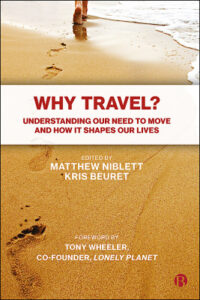The health benefits of travel
November 2017
In our last blogpost we explored ‘health tourism’ – the act of travelling in order to receive medical treatments or undertake activities to improve one’s health and wellness – but according to some scientific studies, travel in itself can benefit our health. The health benefits of travel also formed a central issue of discussion at the ITC’s annual lecture earlier this year.
Travel has been shown to have positive effects on physical health, and has been associated with reduced cardiovascular disease (which is now the number one cause of death globally). Physical activity has long been known to have a huge impact on our physical and mental well-being; reducing risk of heart disease, diabetes and many other physical problems as well as improving mood and reducing the risk of Alzheimers in later life.[1] Travel which involves activity – whether that be cycling to work or a walking tour of a foreign city – may therefore have positive health impacts. But recent studies indicate that travel is associated with improved physical health regardless of the levels of physical activity undertaken. One recent study found that those who took holidays away from home more than once a year were at less risk of heart disease;[2] and another study showed that physical complaints and quality of sleep were both improved for as long as five weeks after a holiday, particularly if that holiday involved travel away from home.[3]
Studies have also found that travel can improve cognitive health. “Travel and change of place impart new vigor to the mind,” said the Roman philosopher Seneca, describing a sentiment which has been echoed down the ages: that travel benefits our brains. More recently, scientific studies have recorded and to some extent explained the causes of these positive impacts. According to neuroanatomist Marian C. Diamond, novelty and challenge are two essential factors in the healthy ageing of our brains.[4] As Dr Paul Nussbaum comments: “Travel is good medicine. Because it challenges the brain with new and different experiences and environments, it is an important behavior that promotes brain health and builds brain resilience across the lifespan.”[5] There is also evidence that travel to other countries can improve our creativity. Some studies indicate that the act of travel in itself is not sufficient but rather the traveller must engage as fully as possible in the new cultures and environments they encounter in order to acquire a boost in creative thinking.[6] However, it is intriguing to note that in some laboratory studies even the idea of distance has been found to increase people’s creativity. This hints that travel and imagination may be linked in some way deep within our evolutionary past, an idea examined in depth by writer Tony Hiss in his book In Motion.[7] Hiss points to research by evolutionary biologists that link our cognitive development with our origin as hunter-gatherers, scanning horizons and travelling long distances across the savanna.
As well as these cognitive benefits, travel has been shown to have important impacts on our mental and emotional health by decreasing stress and increasing happiness. For example, a study of women in the US found that “the odds of depression and tension were higher among women who took vacations only once in 2 years or once in 6 years compared to women who took vacations twice or more per year.”[8] Other studies have found that experiences such as travel give us more and longer lasting happiness than material possessions.[9] Interestingly, the anticipation of a trip can have at least as big an impact on happiness as the experience or remembrance of it: so travel can improve emotional well-being before, during and after the event.[10]
Travel, however, may not always have such beneficial effects. One study which found travel to have a positive impact on well-being reported that this effect was dependent on how much personal time was available to the holiday-maker and their overall satisfaction with their holiday.[11] That is, they found that it is the quality of the travel experience rather than the act of travel in itself that enables people to relax and unwind, which in turn may improve with physical and mental well-being. And of course travel itself can in certain circumstances create risks to our health, including air pollution, transportation accidents, deep vein thrombosis, jet-lag, and radiation and infectious disease exposure. As discussed in an earlier blogpost, recent research indicates that for ‘hypermobile’ travellers the practice of very frequent long-distance travel can have negative impacts on home-based family and social life, as well as causing stress, loneliness, and increased likelihood of psychological disorders.[12]
Despite these risks, there is clear evidence that travel, if done in the right way, can have multi-faceted positive effects on our health. Whether we choose to travel specifically in search of health benefits or just because on some level it makes us feel good, the pursuit of health benefits form, both consciously and unconsciously, a major motivation of human travel. The Independent Transport Commission believes that travel is about more than simply fulfilling the need to get from A to B and that we are driven to travel by a range of not-yet fully appreciated motivations, amongst them the pursuit of health and well-being. The ITC’s Why Travel? Project has been set up to explore the complexity of human travel motivations and behaviours in the belief that a better and more realistic understanding of why we travel can and should be used to make better decisions about travel at individual and policy levels. The project brings together experts from across the arts, humanities and sciences, exploring cutting-edge research and modern movements, as well as looking back into our evolutionary past and human history for insights into why we travel in the ways we do. For more information on the project, including expert views and news stories, see www.whytravel.org.
See also:
Health Tourism blogpost
Active Travel blogpost
Hypermobility blogpost
Travel and the Mind topic page
Biology topic page
ITC Annual Lecture 2017
Notes:
[1] This is explored further by Professor Charles Pasternak in his chapter on Biology in the ITC’s forthoming book Why Travel?
[2] According to a study by The Global Commission on Aging and Transamerica Center for Retirement Studies, in partnership with the U.S. Travel Association: “Women who vacationed every six years or less had a significantly higher risk of developing a heart attack or coronary death compared with women who vacationed at least twice a year. Men who did not take an annual vacation were shown to have a 20% higher risk of death and about a 30% greater risk of death from heart disease.” https://www.globalcoalitiononaging.com/v2/data/uploads/documents/destination-healthy-aging-white-paper_final-web.pdf
[3] https://www.ncbi.nlm.nih.gov/pubmed/10912359
[4] See Tony Hiss’s forthcoming chapter for the ITC’s book Why Travel?
[5] https://www.globalcoalitiononaging.com/v2/data/uploads/documents/destination-healthy-aging-white-paper_final-web.pdf
[6] https://www.theatlantic.com/health/archive/2015/03/for-a-more-creative-brain-travel/388135/
[7] https://www.theguardian.com/travel/2010/mar/14/why-travel-makes-you-smarter For more on the links between travel and imagination in our evolutionary past see Tony Hiss’s chapter Travel and the Mind in the ITC’s forthcoming book.
[8] https://www.ncbi.nlm.nih.gov/pubmed/16218311?ordinalpos=12&itool=EntrezSystem2.PEntrez.Pubmed.Pubmed_ResultsPanel.Pubmed_RVDocSum
[9] https://blogs.scientificamerican.com/mind-guest-blog/this-holiday-season-spend-on-doing-rather-than-having/
[10] https://www.ncbi.nlm.nih.gov/pubmed/20234864
[11] https://www.ncbi.nlm.nih.gov/pubmed/15996454
[12] Cohen, S.A. & Gössling, S. (2015). A darker side of hypermobility. Environment and Planning A, 47, DOI: 10.1177/0308518X15597124



